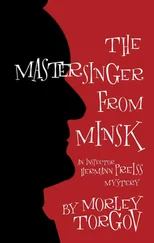Morley Torgov - Murder in A-Major
Здесь есть возможность читать онлайн «Morley Torgov - Murder in A-Major» весь текст электронной книги совершенно бесплатно (целиком полную версию без сокращений). В некоторых случаях можно слушать аудио, скачать через торрент в формате fb2 и присутствует краткое содержание. Жанр: Исторический детектив, на английском языке. Описание произведения, (предисловие) а так же отзывы посетителей доступны на портале библиотеки ЛибКат.
- Название:Murder in A-Major
- Автор:
- Жанр:
- Год:неизвестен
- ISBN:нет данных
- Рейтинг книги:5 / 5. Голосов: 1
-
Избранное:Добавить в избранное
- Отзывы:
-
Ваша оценка:
- 100
- 1
- 2
- 3
- 4
- 5
Murder in A-Major: краткое содержание, описание и аннотация
Предлагаем к чтению аннотацию, описание, краткое содержание или предисловие (зависит от того, что написал сам автор книги «Murder in A-Major»). Если вы не нашли необходимую информацию о книге — напишите в комментариях, мы постараемся отыскать её.
Murder in A-Major — читать онлайн бесплатно полную книгу (весь текст) целиком
Ниже представлен текст книги, разбитый по страницам. Система сохранения места последней прочитанной страницы, позволяет с удобством читать онлайн бесплатно книгу «Murder in A-Major», без необходимости каждый раз заново искать на чём Вы остановились. Поставьте закладку, и сможете в любой момент перейти на страницу, на которой закончили чтение.
Интервал:
Закладка:
I took a fresh page from my notebook and wrote down the following list of names in alphabetical order:
Adelmann
Brahms
Liszt
Möbius
Schumann (Clara)
Wieck
I propped up the notebook against a pile of books atop my desk, sat back, and stared at the list. Had I omitted anyone? Any artist of Robert Schumann's stature was bound to have numerous rivals, enemies, critics; yet it seemed to me that only the persons whose names I had set down on paper would have had sufficient connection to be taken seriously. One by one, I began to consider the suspects.
Adelmann? Would he have bribed Hupfer to so undermine Schumann that the poor fellow would eventually be driven to attempt suicide? Adelmann was about to publish what would doubtless quickly become a highly-readable (not to mention profitable) biography of Schumann. Surely, it would behoove him to do everything to prolong, not curtail, the composer's life. I dipped my pen into its inkwell and ran a thick line through the first name on the list.
Brahms? No. Too young, and therefore too impecunious to be in a position to lavish large sums on Hupfer. Besides, perhaps he was being truthful with me about the limits of his feelings for Clara Schumann, after all. Brahms's name was therefore struck from the list.
Franz Liszt? A bitter enemy for artistic reasons, yes. But much too full of his own eminence to risk being caught up in shabby criminal activity. Though the great man was no stranger to the civil courts-breach-of-promise suits and claims for unpaid bills had turned him into a professional defendant-the thought that Liszt would engage in any conduct that would render him liable to a term in prison was simply too preposterous. His name, too, was ruled through.
Dr. Paul Möbius? I strongly suspected that someday, probably after his time and my own, the world of medicine would come to regard this physician as an unpardonable fraud. But that wasn't the point, was it? The point was that, at this moment in time, many of his colleagues took him seriously, and no one took him more seriously than he himself. Consumed with his so-called theory of mental illness and its relationship to creative endeavour, he would regard Robert Schumann as his experimental animal, his guinea pig, so to speak. His remark to Helena Becker came to mind, about how fears have a way of becoming realities. Obviously, the doctor was intrigued by this idea, especially as it pertained to Schumann. I concluded, therefore, that Dr. Möbius would benefit more by Schumann's life rather than his death, and his name, too, was deleted with the stroke of my pen.
Would Clara Schumann be the one supplying Hupfer with generous amounts of cash? Not likely. Every thaler this woman earned went of necessity toward feeding, clothing and housing her family. With her husband largely incapacitated, there would be no money to spare. True, whenever their eyes met, the spark between Clara and Brahms was as palpable now as when I first noticed them together, and though my questions and doubts about them had begun to run like veins through my reasoning, I could not imagine that she alone, or the two of them together, could produce the quantities of money Hupfer was spending at Thüringens jewellery shop. And so Clara Schumann's name, like the others before hers, was struck off.
This left the name at the bottom of the list: Professor Friedrich Wieck. I pronounced that name several times, and found myself each time adding the cliché “Last but not least.” Indeed, last but not least!
Another thought came to mind: Hupfer's appearance at No. 15 Bilkerstrasse while Wieck conveniently was present at the house and the Schumanns conveniently were away at Bad Grünwald…
Then something struck me-something that had not caught my attention at the time: Hupfer had shown up without his leather satchel that contained the tools of his trade. What, then, could have been the purpose of his attendance at the house? If he came unequipped, was this purely a social call? Or was Hupfer calling on Wieck to collect money?
Chapter Thirty-Two
I made it clear that my plan was to be followed to the letter, beginning with the delivery of a note by the Schumanns’ faithful housekeeper to Willi Hupfer. This was to be done precisely at twelve o'clock noon, when Hupfer-a man of unswerving habits according to Clara Schumann-would have returned home from wherever he might be working and be sitting down to his big meal of the day.
“I have to tell you,” the housekeeper reported on her return, “that he was very annoyed, Madam Schumann, very annoyed indeed. He said he was very busy, too busy, in fact. I pretended not to hear, but he definitely uttered an oath I would not dare to repeat.”
“Yes, yes,” Clara said, “but will he come? ” The housekeeper threw up her shoulders as if to say “Who knows?”
One hour later, Clara had her answer. Out of breath, a scowl leaving no doubt of his annoyance, Wilhelm Hupfer was admitted to the parlour of the Schumann house. “Willi!” Clara said, springing from her piano bench, “thank God you've arrived!” Looking about him at the members of the Düsseldorf Quartet already assembled in the room, he seemed taken aback. “I did not expect to find all of you here,” he said.
“You see how important you are,” Clara said taking the man's coat, folding it, and laying it neatly over the back of a chair. “The five of us have been sitting here completely immobilized. You, and only you, Willi, have the power to rescue us.”
“You flatter me, Madam,” Hupfer said, slowly warming.
“I assure you, it's not idle flattery,” Clara said. She turned to the members of the quartet. “Whatever would we do without our technical genius!” All four players chimed in with extravagant praise.
Instead of responding with a mixture of gratitude and pride, as one, knowing him, would have expected, Hupfer indulged in an uncharacteristic show of modesty, reminding his admirers that he had always striven to do his best, but adding quickly, “Though, God knows, occasionally I do fall short because of my habit of demanding too much of myself.”
Everyone in the room nodded in sympathy with him, and Clara broke in with, “Ah, but God knows how hard you try, so perhaps your rewards will come in the afterlife.”
To this bit of optimism, Hupfer's response was a dismissive shrug. “Perhaps,” he said, “but I am not counting on it. And now, if you will excuse me, to work.”
Resuming a businesslike manner, he put down his leather satchel containing his tools next to the Klems grand piano. “I did caution you and the Maestro about this instrument, Madam Schumann,” he said, sounding like a schoolmaster chiding an errant pupil.
Relishing the fact that five very dependent souls anxiously awaited his next move, Willi Hupfer sat himself down at the keyboard of the Klems. As though he were a virtuoso about to perform, he took a minute or two to adjust the piano bench, fussing with the knobs until the height of the upholstered seat was exactly to his satisfaction. He shifted the bench, now back a little, now forward a little, until the toes of his shoes were within comfortable reach of the pedals. He rubbed his hands together vigorously to warm up the fingers. At last, he raised his right arm, brought his hand down, and played at moderate speed the C-major scale on the upper two octaves of the Klems. This was followed by a similar demonstration over the lower two octaves. He paused at this point for dramatic effect. “Well, I suppose one gets what one pays for,” he said, his lips pursed in contempt for the instrument. “At least the upper and lower ranges are tolerable.”
“Try the middle range, Willi,” Clara Schumann suggested.
Читать дальшеИнтервал:
Закладка:
Похожие книги на «Murder in A-Major»
Представляем Вашему вниманию похожие книги на «Murder in A-Major» списком для выбора. Мы отобрали схожую по названию и смыслу литературу в надежде предоставить читателям больше вариантов отыскать новые, интересные, ещё непрочитанные произведения.
Обсуждение, отзывы о книге «Murder in A-Major» и просто собственные мнения читателей. Оставьте ваши комментарии, напишите, что Вы думаете о произведении, его смысле или главных героях. Укажите что конкретно понравилось, а что нет, и почему Вы так считаете.












